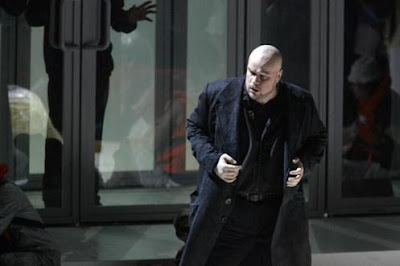Der Fliegende Holländer from the Netherlands Opera
This brilliant, occasionally terrifying production of Wagner's Der Fliegende Holländer comes, appropriately enough, from the Netherlands Opera. It is conducted by Hartmut Hänchen, who led an interesting Dutch DVD set of The Ring a few years ago. In fact it's really good until it sinks (with all hands) in the final scene.
Things start promisingly. Director Martin Kusej moves the action to a cruise ship, perhaps somewhere in the Bermuda Triangle. Daland is a "Love Boat"captain in naval whites and mirror shades. The Steersman puts on a gold lamé jacket before singing. Daland's crew and the Sandwyk villagers are re-imagined as vulgar tourists, scurrying about in life vests, carrying suitcases, bathing poolside, and wearing "party wigs" in the final act. The Dutchman's crew are strange and shadowy, monk-like in dark cowls.
In the middle of all this we find the Dutchman, played with intensity by Finnish bass Juha Uusitalo. Mr. Uusitalo is a hulking, intimidating presence, under a bald pate and glaring through ice-blue eyes. It doesn't hurt that he has a voice to match, billowing and blustery when needed and bringing the power when needed to fight over the orchestra. He is in the position of a refugee seeking asylum, but is treated as an unwelcome intrusion of reality into the insulated world of Captain Daland's cruise ship.
Senta (Catherine Naglestad) is his ideal match, the one serious (old-fashioned?) woman on a ship full of frivolity. It is significant that she is the only one spinning in the second act. The other girls bully her and try to play "keep-away" with her wheel. The soprano sings with power, delivering a fine ballad and engaging in a powerful duet with Mr. Uusitalo helped by the conductor's crisp tempos. Their love affair is like the meeting of two high school nerds with limited social interactive ability. The big duet in Act II is both delicious and painful to watch.
Things come to a head in the Act III trio, with Marco Jentsch making a marginally sympathetic figure out of Erik. In a brilliant moment, this ensemble is performed with Mr. Uusuitalo onstage, and his emotional reactions at the dialogue between Senta and Erik is visceral, almost painful to watch. The trio that follows is everything it should be, the emotional core of the drama and Senta's conflict laid bare even as Wagner's orchestra batters at the senses. However, the unbelievable, altered ending (Erik shoots the Dutchman and Senta dead) kills the final act and leaves a sour taste.
 |
| Juha Uusitalo in the title role of Der Fliegende Holländer. Photo from the Netherlands Opera © 2010 Opus Arte |
Things start promisingly. Director Martin Kusej moves the action to a cruise ship, perhaps somewhere in the Bermuda Triangle. Daland is a "Love Boat"captain in naval whites and mirror shades. The Steersman puts on a gold lamé jacket before singing. Daland's crew and the Sandwyk villagers are re-imagined as vulgar tourists, scurrying about in life vests, carrying suitcases, bathing poolside, and wearing "party wigs" in the final act. The Dutchman's crew are strange and shadowy, monk-like in dark cowls.
In the middle of all this we find the Dutchman, played with intensity by Finnish bass Juha Uusitalo. Mr. Uusitalo is a hulking, intimidating presence, under a bald pate and glaring through ice-blue eyes. It doesn't hurt that he has a voice to match, billowing and blustery when needed and bringing the power when needed to fight over the orchestra. He is in the position of a refugee seeking asylum, but is treated as an unwelcome intrusion of reality into the insulated world of Captain Daland's cruise ship.
Senta (Catherine Naglestad) is his ideal match, the one serious (old-fashioned?) woman on a ship full of frivolity. It is significant that she is the only one spinning in the second act. The other girls bully her and try to play "keep-away" with her wheel. The soprano sings with power, delivering a fine ballad and engaging in a powerful duet with Mr. Uusitalo helped by the conductor's crisp tempos. Their love affair is like the meeting of two high school nerds with limited social interactive ability. The big duet in Act II is both delicious and painful to watch.
Things come to a head in the Act III trio, with Marco Jentsch making a marginally sympathetic figure out of Erik. In a brilliant moment, this ensemble is performed with Mr. Uusuitalo onstage, and his emotional reactions at the dialogue between Senta and Erik is visceral, almost painful to watch. The trio that follows is everything it should be, the emotional core of the drama and Senta's conflict laid bare even as Wagner's orchestra batters at the senses. However, the unbelievable, altered ending (Erik shoots the Dutchman and Senta dead) kills the final act and leaves a sour taste.
Hartmut Haenchen opts for an energetic reading of the score, with the famous salt-spray figures and charging horns prominent in the famous overture. He takes the three acts without an intermission, but opts for Wagner's revised "redemption" music, both at the end of the Overture and the finale of the third act. The choral singing (all-important in this opera is tight and snappy, leading to a virtuoso moment in the third act when the two worlds collide. If it weren't for that ending, this Dutchman would be highly recommended.
Watch a trailer for Der Fliegende Holländer here.




